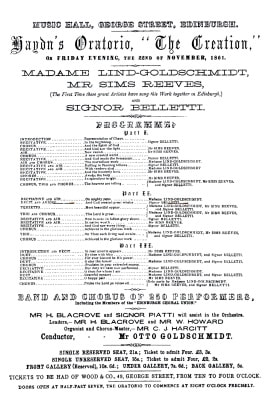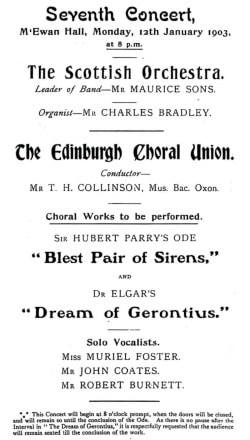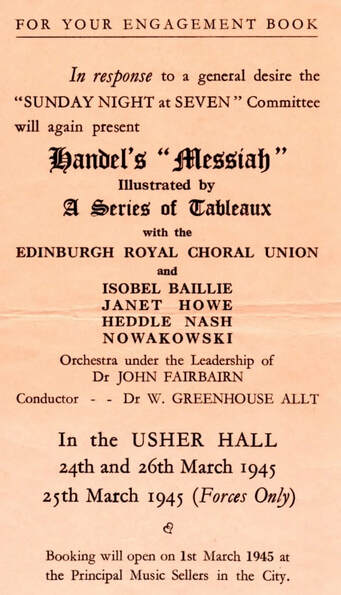There are several pages in this section. The first page gives an account of the first 100 years of the choir. Other pages describe anniversary celebrations from the past with various photographs. See the drop down list in the menu under "History" or at the bottom of the page.
ERCU's History
1858 - 1908
|
Beginnings
The Edinburgh Royal Choral Union originated in the choir of St Mary’s Roman Catholic Church in Broughton Street, now the Cathedral of the Roman Catholic Diocese of St Andrews and Edinburgh. Mr Charles J Hargitt, organist of St Mary’s Church in 1858, thought that the capital city of Edinburgh ought to have a choir of far bigger dimensions than the average church choir for the study and performance of the great classics in choral music. Glasgow had had its Choral Union then for 14 years. Accordingly, by newspaper advertisement, he called a meeting, held in Wood’s Musical Rooms, Waterloo Place, on 25 November, which was attended by about 30 men, mostly members of St Mary’s Choir. The Choral Union was formed, members enrolled and a conductor, Mr Hargitt, office-bearers and a committee of nine were appointed. |
|
Jenny Lind in Edinburgh
For a year or two after its institution, the society sang mainly at concerts organised by others, for example, at several University of Edinburgh Reid concerts and at some Saturday evening concerts organised by Mr William Howard. The most notable of those outside engagements was in November 1861, when the choir took part in a performance of The Creation organised by a London impresario. Two of the soloists were the famous Jenny Lind ,“The Swedish Nightingale” and the greatest tenor of his day, Sims Reeves. |
|
Famous Soloists
From its earliest years the society had the assistance of the most famous singers in the country, among them Madame Albani, Signor Foli, Edward Lloyd, Sims Reeves, Madame Patey, Marie Rôze and Sir Charles Santley. Later distinguished singers included Andrew Black, John Coates, Ben Davies, Ffrancon Davies, Gervase Elwes, Durward Lely, Kirby Lunn, Agnes Nicholls and Robert Radford. Sims Reeves, the greatest English tenor of his day, sang only once for the Choral Union, and thereby hangs a tale. He was engaged to sing the tenor solos in a performance of Sullivan’s The Prodigal Son but because of indisposition he was unable to sing two of his six solos as well as “Waft her, angels” from Jephtha. Mr Reeves offered to reduce his fee of 90 guineas by 10 guineas, but the Choral Union declined this proposal and offered him 60 guineas. That was the sum awarded by the Sheriff-Substitute when Mr Reeves raised an action for his full 90 guineas fee. He gained nothing by his litigation, for he had to pay the expenses of the action. |
Messiah
Messiah was first sung by the society in 1861. Annual new year performances at 12 noon began in 1888, uninterrupted even by two world wars.
Messiah was first sung by the society in 1861. Annual new year performances at 12 noon began in 1888, uninterrupted even by two world wars.
1908 - 1958
Our 50th anniversary was in 1908. You can read more about that and see photos here.
The second 50 years embraced two world wars. Listening to good music was found to be the best escape from the anxieties of those dreadful years.
Royal Charter
In 1911 the society received a royal charter and was henceforth entitled to be called the Edinburgh Royal Choral Union.
Our conductor is interned
When the resignation of Dr Collinson was accepted in 1913, Mr Gottlieb Feuerberg, of Perth, was unanimously appointed. Mr Feuerberg conducted the new year’s day performance of Messiah in 1914. Then he prepared the choir for a concert version of Wagner’s Parsifal, conducted by Emil Mlynarski, the conductor of the Scottish Orchestra, after which he conducted a performance of Mendelssohn’s Hymn of Praise at the opening of the Usher Hall on 6 March of that year.
But although he had been in this country for eighteen years, and had married the daughter of a Scottish clergyman, Mr Feuerberg did not apply for naturalisation until war broke out, and it was then, of course, too late. He was arrested and interned as an enemy subject shortly after the outbreak of war.
Diamond Jubilee
In the last year of the First World War the society celebrated its diamond jubilee (60 years) with two concerts in March, for which the Hallé Orchestra was engaged. At the first, Mr Greenhouse Allt conducted the choir in a performance of Elgar’s choral trilogy The Spirit of England and at the second Sir Henry Wood conducted a programme that included Beethoven’s Choral Symphony.
The second 50 years embraced two world wars. Listening to good music was found to be the best escape from the anxieties of those dreadful years.
Royal Charter
In 1911 the society received a royal charter and was henceforth entitled to be called the Edinburgh Royal Choral Union.
Our conductor is interned
When the resignation of Dr Collinson was accepted in 1913, Mr Gottlieb Feuerberg, of Perth, was unanimously appointed. Mr Feuerberg conducted the new year’s day performance of Messiah in 1914. Then he prepared the choir for a concert version of Wagner’s Parsifal, conducted by Emil Mlynarski, the conductor of the Scottish Orchestra, after which he conducted a performance of Mendelssohn’s Hymn of Praise at the opening of the Usher Hall on 6 March of that year.
But although he had been in this country for eighteen years, and had married the daughter of a Scottish clergyman, Mr Feuerberg did not apply for naturalisation until war broke out, and it was then, of course, too late. He was arrested and interned as an enemy subject shortly after the outbreak of war.
Diamond Jubilee
In the last year of the First World War the society celebrated its diamond jubilee (60 years) with two concerts in March, for which the Hallé Orchestra was engaged. At the first, Mr Greenhouse Allt conducted the choir in a performance of Elgar’s choral trilogy The Spirit of England and at the second Sir Henry Wood conducted a programme that included Beethoven’s Choral Symphony.
|
The Second World War
The Edinburgh Choral Union did its part in providing much of the music that was wanted and took part in several of the Sunday Night at Seven entertainments for the forces. The Messiah was given in St Giles' Cathedral each May for the special benefit of the members of the General Assembly. Other oratorios sung in St Giles were Mendelssohn’s Elijah and Hymn of Praise, Haydn’s The Creation and Bach’s St Matthew Passion. |
1958 to the present
ERCU continues to promote new music and give Scottish premieres, including The Farthest Shore by Paul Mealor, The Voices of our Ancestors by Thea Musgrave and St John Passion by Bob Chilcott. The Scottish Chamber Orchestra joined ERCU in 2009 for its world premiere performance of Judith Bingham’s Shadow Aspect, commissioned for the choir’s 150th anniversary. ERCU performed another work by Judith Bingham, The Christmas Truce, in November 2014 as part of a programme of music to commemorate the centenary of the beginning of the Great War. Earlier that year the choir joined the Royal Scottish National Orchestra in concerts to celebrate the Commonwealth Games and the centenary of the completion of the Usher Hall.
Other highlights have included visits to Orkney’s St Magnus International Festival for performances alongside the St Magnus Festival Chorus, the Festive Street of Light in Edinburgh, for which Messiah choruses were recorded with the SCO, Holst’s Planets in the Usher Hall with the Royal Philharmonic Orchestra and a sell-out performance in 2018 at the magnificently restored McEwan Hall of Verdi’s Requiem side by side with the Edinburgh University Chamber Choir and student instrumentalists.
Other highlights have included visits to Orkney’s St Magnus International Festival for performances alongside the St Magnus Festival Chorus, the Festive Street of Light in Edinburgh, for which Messiah choruses were recorded with the SCO, Holst’s Planets in the Usher Hall with the Royal Philharmonic Orchestra and a sell-out performance in 2018 at the magnificently restored McEwan Hall of Verdi’s Requiem side by side with the Edinburgh University Chamber Choir and student instrumentalists.
You can see photographs and read about our anniversaries and other celebrations by clicking the links below.
History - Jubilee - Centenary - 125th anniversary - 150th anniversary - Royal Charter centenary - Usher Hall centenary - Edinburgh Festivals
History - Jubilee - Centenary - 125th anniversary - 150th anniversary - Royal Charter centenary - Usher Hall centenary - Edinburgh Festivals








